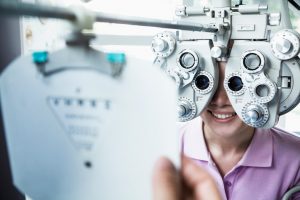
Through a comprehensive eye exam, an ophthalmologist can assess visual acuity and eye health. The doctor will perform several tests, including dilation of the pupil with special eye drops to view the retina and optic nerve. It is essential that eye issues are diagnosed and treated because certain vision problems affect not only eyesight but also overall wellness.
When and How Often Should You See an Eye Doctor?
The American Academy of Ophthalmology suggests that you get a baseline eye examination at age 40 because this is often the time when early signs of eye disease or vision changes appear. A baseline vision screening allows your ophthalmologist to detect signs of eye disease at an early stage when intervention and treatment are most effective.
Many people need a comprehensive eye exam before the age of 40. If you have a chronic medical condition like hypertension or diabetes or a family or personal history of eye disease, you should see an ophthalmologist earlier (source: AAO).
After your eye examination, your ophthalmologist can tell you how often you should have your eyes examined. This will depend on your medical history, family history and other risk factors for age-related diseases like glaucoma, macular degeneration and cataracts. Most adults should have their next comprehensive eye exam in the next year to two years.
